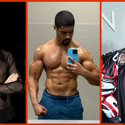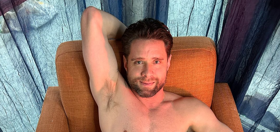Rob Epstein and Jeffrey Friedman, the filmmakers who added immeasurably to the legacy of Harvey Milk with their Oscar-winning 1984 documentary about the late activist, are now focused on uncovering the truth about another 1970s icon. With their new film Lovelace, the duo uncover both the public and private lives of Deep Throat star Linda Lovelace (Amanda Seyfried), who during her heyday seemed the model of the sexually liberated woman, but who later with the publication of her memoir Ordeal revealed the contradictory dark underside of her fame and the abuse she suffered at the hands of husband Chuck Traynor (Peter Sarsgaard). Lovelace, which also features performances by James Franco, Chris Noth, Sharon Stone and Bobby Cannavale, is now playing in select theaters and available on VOD.
The filmmakers chat with Queerty about how their new film might speak to gay audiences, their upcoming documentary about amfAR and their controversial next project —a bio of gay rights opponent Anita Bryant.
When did Deep Throat first enter your consciousness and what did you think of it?
Jeffrey Friedman: I grew up in Manhattan so I used to sneak down to Time’s Square to look at dirty pictures. I think that’s when I saw it on a marquee.
How about we take this to the next level?
Our newsletter is like a refreshing cocktail (or mocktail) of LGBTQ+ entertainment and pop culture, served up with a side of eye-candy.
Rob Epstein: I was in college and there were midnight screenings along with Pink Flamingos so I kind of thought of it in that context as counter-cultural. I thought it was cartoony and campy and racy in the way that Pink Flamingos was racy. I didn’t have much historical context for it. Then when we got into the research of this movie it was situated more in an historical context. It felt like more of a countercultural phenomenon.
 What does Linda Lovelace represent to people?
What does Linda Lovelace represent to people?
Friedman: At first she represented the girl next door. She was a non-traditional porn star. She wasn’t blond and buxom. She was nice looking but not a knock-out beauty. That was something new. She also had a quality that people responded to. I think what made Deep Throat so successful is that she had such a natural, guileless quality which served her throughout her life. Even in later years when she was telling the darker version of that period she had that same kind of straight-ahead, guileless presentation. At that point she became a symbol of a woman claiming her own body and her own power. But that was many years later.
Epstein: After she became he poster girl for the mainstreaming of porn and more frank and open conversations about sex, she was the first reality star in a sense. Then she spent the rest of her life resenting it because there wasn’t any payoff for her as there is for reality stars today.
Friedman: She also felt that people were profiting from a time in her life when she was being abused.
Why was it important for you to make this film?
Epstein: That period is fascinating. It was the sexual coming-of-age of the culture.
Friedman: At the same time we came to learn that that sexual revolution was really just phase one. It was the sexual revolution for straight men. Women had to create their own revolution and so did gay people. What interested us was to show that that period had a lot more complexity to it as embodied in the story of this singular person. Her singular circumstance was that she was in a situation as the victim of domestic violence that set up all the other circumstances. We didn’t even have the language at the time to talk about domestic violence and the cyclical nature of that. It seemed like an important time when all of this was starting to come into the culture yet we didn’t really have the context and language for it all. Now we’re further along in continuum of all of this. Porn is now ubiquitous and free and kids are growing up with it. Women have taken control of their participation in porn.
As part of our research we went to a shoot and the director was a woman and the lead talent was a woman who controlled how the guys were going to cum. We’re in a different world now in all those respects.
How can the film resonate with LGBT viewers?
Epstein: When people ask us why you as two gay men are interested in this subject, we talk about the same self-identity claim that Linda had to go through, which is not unlike what we as gay people have to go through. Most people don’t go through life having to rethink their own identity. It’s just a progression. As gay people we have to own our identity and articulate it in some way. Linda had to do that in a really different circumstance, but as a woman she had to find her own power. As gay people, we have to do that. We have to find our own power. Fortunately we’re changing the world and the world is changing with us so we’ll se where we end up on that continuum. Gay people still have to come out.
You tell the film two different ways. First from the perspective the public had of the events at the time and then in a way that mirrored Linda’s psychology. What were your thoughts in doing this?
Friedman: It was to track her psychology and tell her story the way she presented it to the world. We thought we knew who she was and that she presented this knowledge to us. She presented herself as somebody who loves to have sex and had no hang-ups, that she was just a fun-loving girl. That’s how we thought of her until we learned there was a whole different layer to the story. We wanted to mirror that. And show the way the public learned her story.
Do you believe her memoir Ordeal?
Epstein: We had to decide what our point of view was going to be. Ultimately we decided to tell it from her point of view. We believe that she was abused by Chuck because we saw an interview with Chuck in which he says he did slap her around. He didn’t consider that do be domestic abuse, but he said, “Yeah, I slapped her around.” We took that at face value.
Friedman: In terms of her participation in porn and whether or not she was willing, all we can know is that she was 22 when she did it. She did it very briefly and she did it while she was married to Chuck Traynor. We don’t make any judgments about that. There’s nothing in our presentation that’s commenting on porn.
Your documentary Battle of amFAR has been well-received on the festival circuit and will air December question. There’s this somewhat common idea that a lot of young people are very ignorant about the AIDS epidemic and the struggles gay men have faced. In researching the film or maybe at screenings, what evidence have you seen of this?
Friedman: We see the statistics. Young people are being infected at alarming rates. I think we have had young gay people at screenings come up to us afterwards and say they didn’t really understand what it was like back then when we were in the thick of it.
Epstein: I think there needs to be a resurgence of information outreach. We’re at a different juncture in regards to the epidemic and meds and prep and all of that. I think either grassroots or established organizations need to step up and get on the same page as far as the information that’s disseminated. Right now it’s the community talking to ourselves but I’m not sure to what degree is getting information out there.
 Is there someone out there who can give the foundation’s work as much visibility as Elizabeth Taylor did?
Is there someone out there who can give the foundation’s work as much visibility as Elizabeth Taylor did?
Epstein: Someone we’ve been working closely with who’s a force of nature is Regan Hofmann. She’s in the film. She’s a white woman of privilege. She feels like she’s saying to the gay community that she needs them to get involved again. She needs this resurgence of energy. She’s incredible and very knowledgeable.
Friedman: There’s a group called generationCURE, which is connected to amFar that is specifically aimed at younger people. It’s young gay people speaking to young gay people.
Your next project is a bio of Anita Bryant for HBO. Will your film be an objective, sympathetic look at her?
Epstein: No, the structure of the story is a writer going to meet Anita today and talking with her about her life and those events in Dade County, Florida in the 1970s.
Have you met with Anita?
Epstein: No, but our writer Chad Hodge has.
Why do you feel compelled to tell her story?
Epstein: I think it’s interesting to look at her story from the wrong side of history, knowing where we are at this point in history, and to try to understand her passion and her psychology, because that’s going to be the underbelly of being on the wrong side of history. She’s just a fascinating character. I think we want to try to really understand her and what’s behind that fear.
Friedman: To find out what makes otherwise decent people do hateful things and behave shamefully.
Watch the trailer for Lovelace below.





















boring
Look.
I KNOW they have to glamor up an actress to sell a movie, but come the fuck on: Linda Lovelace looked like if you went to Madame Tussaud’s, stole a wax figure of Adrienne Barbeau and then put it in a giant microwave for eighteen seconds.
oilburner
@boring: true, true . L.Lovelace looked like crap
Brian
Epstein and Friedman have got it so wrong. Porn is NOT about sex. Porn is about having sex for money in front of a camera . It’s prostitution on film.
Don’t forget, also, that porn is very homophobic. It has a bisexual double standard which discriminates against the male homosexual act but embraces lesbianism. Many of the women in porn are extremely homophobic in their attitudes toward the male homosexual act.
If anything, porn is anti-freedom and pro-homophobia..
As for Linda Lovelace, didn’t she have a drug habit? She made poor choices in her life.
gaym50ish
They have it ALL wrong about why “Deep Throat” was so successful. It was successful because it was the only porn movie that they ever tried to show in regular first-run theaters rather than only in sleazy porn houses. They thought the world was ready for that in 1972, and they got away with it by making what was essentially a SPOOF of porn movies but was pornographic in itself. Some of the reviews were good, and celebrities were going to see it, so it caught on as a popular thing to go see and even to take a date to.
It was banned in many places, and the additional publicity just made more people want to see it. There were obscenity trials against the producers in some states, but the irony is that it wasn’t any more obscene than porn movies that were already being shown in adult theaters in those states. The film was wildly popular because of all the publicity. It had nothing to do with Linda Lovelace’s performance, and in fact all the acting was pretty bad.
Dr. Janice N!Godatu
@boring: Ha ha ha ha ha ha ha! Exactly!